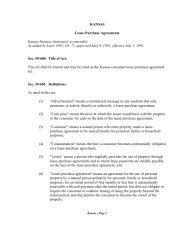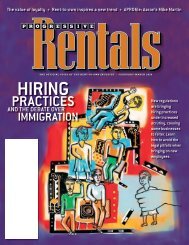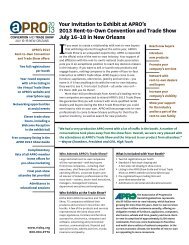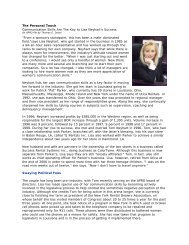Progressive Rentals - APRO
Progressive Rentals - APRO
Progressive Rentals - APRO
You also want an ePaper? Increase the reach of your titles
YUMPU automatically turns print PDFs into web optimized ePapers that Google loves.
26 PROGRESSIVE RENTALS JANUARY-FEBRUARY 2004 27
M<br />
“Periodically, analysts for research firms that follow<br />
the RTO industry for various institutional clients invite<br />
industry executives to talk about their company and their<br />
prospects,” Anderson says. “They thought it would be<br />
interesting to hear a presentation from someone outside<br />
the industry this time.”<br />
The professors’ research is particularly interesting<br />
because it largely contradicts previous studies, which<br />
have tended to view RTO contracts as “disguised installment<br />
agreements.” Central to this debate is the question<br />
of whether RTO is used by customers as a means to purchase<br />
or rent household items.<br />
Past studies, most notably the Federal Trade<br />
Commission report of 2000, relied on customer interviews<br />
and found that 60 percent to 70 percent of rentalpurchase<br />
agreements resulted in the item being purchased.<br />
However, by examining transactional records<br />
over a two-year time period, Anderson and Jaggia found<br />
purchases comprise less than 40 percent.<br />
“I was told my audience was mutual fund managers<br />
and analysts interested in getting additional insight into<br />
what is kind of an under-analyzed sector,” Anderson says.<br />
The Association of <strong>Progressive</strong> Rental Organizations<br />
believes the new research is not only valuable information,<br />
but also provides a powerful tool in the industry’s<br />
public relations and lobbying efforts. “For the past 20<br />
years, our opponents have cited many studies citing the<br />
high costs of RTO and the victimization of our customers,”<br />
says <strong>APRO</strong> Public Affairs Director Richard May.<br />
“Now we have an independent economic analysis that<br />
reflects a different view of the industry and is available to<br />
anybody, whether it’s an investor, judge or legislator.”<br />
“Michael’s work,” says Robert Strauss, a consumer and<br />
retail senior analyst with Independent Research Group,<br />
“brings additional visibility to a segment of retail that<br />
continues to be underserved.” Strauss and Independent<br />
Research Group organized and hosted the meeting with<br />
Anderson in New York City.<br />
ost recently, a small group of Wall Street analysts and<br />
Michael Anderson, an assistant professor of finance at the<br />
University of Massachusetts-Dartmouth, met in New York<br />
to discuss the rent-to-own industry on December 12,<br />
2003. The meeting centered on academic research<br />
Anderson and Sanjiv Jaggia, a professor of economics at<br />
Boston’s Suffolk University, have been conducting on the<br />
RTO transaction, including the results of two papers that<br />
have been published in The Journal of Consumer Affairs<br />
and The Journal of Applied Business Research.<br />
WHY RTO?<br />
Although much of the attention paid to these two<br />
studies has been recent, Anderson’s plunge into<br />
rent-to-own data actually began several years ago<br />
when another professor suggested he<br />
look into the industry for future research. “It<br />
was actually very serendipitous,” Anderson<br />
says about the beginning of his research.<br />
“Raymond Jackson, a colleague in the department,<br />
had this idea to look at the rent-to-own<br />
industry. He had read some literature and<br />
noticed that no prior researcher had put it into<br />
an economic framework.”<br />
Once the professors decided to focus their<br />
economic research on RTO, what they needed<br />
next was to acquire reliable data on which to<br />
base their study.<br />
Anderson and Jackson contacted <strong>APRO</strong>,<br />
hoping the Association would be interested in<br />
providing some research funding. However, in<br />
order to avoid any impression of the research<br />
being industry-funded and keeping it independent,<br />
<strong>APRO</strong> put the professors in touch<br />
with High Touch, a company that provides<br />
RTO stores software to track transactions. “We<br />
were able to get a bunch of data, so what really<br />
started as a modest, little project, turned into<br />
a really major one,” says Anderson.<br />
Based in Wichita, KS, High Touch’s Director of Sales<br />
John Rogers says that he was interested in the possibilities<br />
of Anderson’s research when he first learned about<br />
the project four years ago. “Regardless of how the results<br />
turned out, I was excited to see that a university was<br />
looking at RTO. At that time, there had been no formal<br />
academic research into the industry.”<br />
After poring over data from 100 rental-purchase<br />
stores across the country covering a 10-year time period<br />
between 1991 and 2001, the professors decided to base<br />
their research on 352,646 transactional records, 95 percent<br />
of which originated between 1998 and 2001. “There<br />
is so much information there that is so fascinating not<br />
just in terms of RTO, but economics in general,” says<br />
Anderson. “There aren’t many data sets that are this<br />
detailed about consumer behaviors, so there are many<br />
questions into which we can hopefully gain some<br />
insight.”<br />
OLD QUESTIONS, NEW ANSWERS<br />
The result of Anderson’s initial analysis of the data<br />
turned out to be quite surprising and would later<br />
form the basis for his paper, “A Reconsideration<br />
of Rent-to-Own,” which was published in the<br />
winter 2001 issue of The Journal of Consumer Affairs.<br />
Although the paper confirmed some of the previous<br />
research by other entities, which had found the majority<br />
of RTO customers to be low income and female, it contradicted<br />
the negative view that RTO took advantage of<br />
its customers.<br />
“One thing that was interesting was seeing how little<br />
work had been done on an important industry that<br />
offers what is really a unique arrangement,” says<br />
Anderson.“What existing research that was out there was<br />
all particularly one-sided. It seemed that the only viewpoint<br />
that had been expressed was one that consumers<br />
were being exploited by these agreements. As far as we<br />
know, we published one of the first articles out there that<br />
said, wait a minute, there are other economic reasons<br />
why consumers would be interested in RTO.”<br />
The paper seemed to support what RTO owners had<br />
been saying for years, that RTO offered customers various<br />
options outside the traditional methods of credit<br />
cards and layaway to obtain goods for their homes.<br />
The article suggests that a straightforward casting of<br />
the rent-to-own agreement into a mold of an installment<br />
sales contract obscures the actual benefits and costs to<br />
the consumer and yields misleading public policy recommendations.<br />
In reality, a rent-to-own agreement offers<br />
consumers a series of valuable services and options<br />
unavailable in the installment purchase contract.<br />
“What existing research that was<br />
out there was all particularly<br />
one-sided. It seemed that the only<br />
viewpoint that had been expressed<br />
was one that consumers were being<br />
exploited by these agreements. As<br />
far as we know, we published one of<br />
the first articles out there that said,<br />
wait a minute, there are other<br />
economic reasons why consumers<br />
would be interested in RTO.”<br />
A RECONSIDERATION OF RENT-TO-OWN<br />
So what could be the reason behind such significant<br />
differences in conclusions between<br />
Anderson’s study and earlier research? The answer<br />
lay in whether RTO agreements were classified as<br />
rentals or purchases, which was also the topic of<br />
Anderson’s second paper, “Rent-to-Own Agreements:<br />
Purchases or <strong>Rentals</strong>?” published in The Journal of<br />
Applied Business Research.<br />
If most customers carried their RTO contracts to<br />
term, then they could be classified as purchases, as was<br />
the finding in the FTC telephone study, then the agreements<br />
could be viewed as installment contracts, resulting<br />
in customers paying extremely high annual percentage<br />
rates. In his second paper, however, Anderson’s research<br />
proved otherwise.<br />
“Our main result, derived from an analysis of disposition<br />
and duration, is that RTO agreements are more frequently<br />
used for short-term needs rather than as a<br />
method of acquisition. Legislative and legal efforts to<br />
classify RTO agreements as primary installment contracts<br />
cannot be justified by their pattern of use in the<br />
28 PROGRESSIVE RENTALS JANUARY-FEBRUARY 2004 29
marketplace,” says Anderson.<br />
The second paper was significant from an RTO perspective<br />
because it revealed how customer surveys, as<br />
helpful as they were in determining demographic information,<br />
were severely limited in other ways. Primarily,<br />
studies based upon customer interviews seemed to be<br />
unable to predict accurately whether items<br />
would be returned or rented to term and<br />
purchased.<br />
“The FTC report is based on survey data<br />
and ours is based on transactional data,”<br />
says Sanjiv Jaggia. “They both have their<br />
own appeal in some ways, but there is no<br />
doubt, in any academic’s mind, that transactional<br />
data is more reliable. In a survey<br />
you ask somebody, ‘Are you going to return<br />
the item or purchase it?’ The person will<br />
say ‘yes’ or ‘no’ based on what they are feeling<br />
at the time, but we don’t know what<br />
that person will really do.”<br />
This criticism of customer survey data,<br />
now that it has been accepted into reputable<br />
academic journals, could be helpful<br />
in lobbying for the RTO industry, says<br />
<strong>APRO</strong>’s Richard May. “The second study goes at certain<br />
lengths to question the validity of the conclusions of the<br />
FTC report, which we have had difficulty explaining on<br />
Capitol Hill,” says May. “Before we had the FTC report<br />
saying the RTO customers’ ownership ratio is 70 percent,<br />
which we have always questioned because that is just not<br />
how it is in this business.”<br />
FUTURE RESEARCH AND ARTICLES<br />
After the publication of the first<br />
two papers, detailing the work<br />
he did with Raymond Jackson,<br />
Anderson has continued his<br />
RTO industry research with<br />
Jaggia, who he met in graduate<br />
school at Indiana University.<br />
The pair has co-authored two<br />
more papers, which are currently<br />
in the peer review<br />
process, awaiting publication.<br />
“Rent-to-Own Agreements:<br />
Customer Characteristics and<br />
Contract Outcomes” and “A Multiple Destinations<br />
Analysis of Rent-to-Own Transactions” delve more<br />
deeply into statistical analysis and economic theory.<br />
“Michael contacted me two-and-a-half years ago with<br />
a proposal to work on a few projects concerning rent-toown,”<br />
says Jaggia. “I didn’t know much about the industry,<br />
but he told me about the data he had, which was really<br />
a fabulous data set. My specialization is statistics and<br />
econometrics, so we discussed some things and discovered<br />
we had many ideas that we could pursue,” he says.<br />
Econometrics is the application of mathematical and statistical<br />
methods to economics.<br />
“We are trying to explore these things with cuttingedge<br />
statistical methods and being as careful as we can to<br />
make transactional data more solid and reliable,” says<br />
Anderson. “At the same time, we’re trying to understand<br />
some consumer behaviors, such as how does one pay<br />
[weekly or monthly] and how long the agreement is and<br />
how these factors contribute to the actual outcome of<br />
transactions.”<br />
For their part, Anderson and Jaggia believe the future<br />
of their research into the economics of the rent-to-own<br />
industry and its transaction is very bright. Both expect<br />
their partnership to continue to grow and additional<br />
papers could be inevitable.<br />
High Touch’s Rogers is also looking forward to future<br />
research by the professors because he thinks the more<br />
detailed data will provide a deeper analysis of the RTO<br />
transaction, which will be invaluable to RTO store owners.<br />
“I don’t believe that most dealers manage their business<br />
using industry benchmark data,” he says. “Though<br />
the industry has done well regardless, having this independent<br />
data will be eye-opening and could improve a<br />
company’s records and annual report.”<br />
“We are very optimistic about this research because it<br />
also gives insight into areas outside of the rental-purchase<br />
industry,” says Jaggia. “For example, we are finding<br />
that whether it is a weekly or a monthly rental has a big<br />
impact on whether the item will be returned or not and<br />
there should be absolutely no reason in pure economic<br />
terms why that should make a difference. This, I think,<br />
should have interest for any economist, not just one<br />
studying rent-to-own stores.”<br />
To download a copy of “A Reconsideration of Rent-to-<br />
Own” or “Rent-to-Own Agreements: Purchases or<br />
<strong>Rentals</strong>?,” go to www.<strong>APRO</strong>Vision.org/legalchannel.html. ■<br />
Stephen Schenck is a free-lance writer.<br />
“Having this<br />
independent<br />
data will be<br />
eye-opening and<br />
could improve a<br />
company’s records<br />
and annual<br />
report.”<br />
Associate Member since 1987<br />
30 PROGRESSIVE RENTALS

















